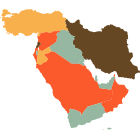Shifting Gender Roles In Syrian Refugee Women’s Pursuit of Livelihoods in Jordan, Iraq and Lebanon
Background:
Released at the fifth Brussels Conference on “Supporting the future of Syria and the region,” Triangle’s report examines the link between livelihoods and protection risks among Syrian refugee women. Forced by Syria’s crisis, many women entered the labor market, facing a dual burden and heightened risks of sexual and gender-based violence. Refugee hosting communities grapple with ongoing challenges, primarily poverty, affecting over 60% of Syrian refugees. UN Women and UNHCR assessments revealed a significant number of female-headed households among displaced Syrians.
Exacerbated by socio-economic hardships, family separation, and community breakdowns, gender discrimination and inequality place refugee women and girls at elevated risks of sexual and gender-based violence. Triangle’s report, commissioned by UN Women, UNHCR, and the ILO, provides crucial data on this interplay, informing livelihoods, gender, and protection initiatives in Iraq and Jordan. The research, conducted from September 2019 to February 2020 in Lebanon, supplemented by qualitative data from Jordan and Iraq, addresses a knowledge gap in understanding the relationship between livelihood opportunities and protection risks, specifically regarding sexual and gender-based violence (SGBV) for Syrian refugees and Iraqi IDPs. Triangle’s study yielded quantitative and qualitative data that inform recommendations for enhancing safe, dignified, and sustainable participation of displaced women in the labor force, fostering long-term empowerment.
Triangle’s Assessment:
- Economic Vulnerability and Gender Norms: The study, commissioned by UN Women, UNHCR, and the ILO, aimed to explore the link between livelihood opportunities and protection risks for Syrian refugee women in Lebanon, Jordan, and Iraq. It offered unique insights into the challenges faced by these women, encompassing discrimination, legal obstacles, and economic struggles. Gender norms, exacerbated by social tensions, further heightened their economic and protection risks.
- Significance of Research: Triangle’s assessment provided critical data on Syrian refugee women’s pursuit of livelihoods in Lebanon, Jordan, and Iraq. It became a vital resource for agencies working on livelihoods, gender, and protection in these regions. The research formed the basis for recommendations to enhance future livelihood programming, emphasizing secure, dignified, and sustainable participation of displaced women in the labor force.
- Challenges and Vulnerabilities: Syrian refugee women encountered multiple hurdles, including discrimination, lack of legal residency, and economic hardships. With only 20% of registered Syrian refugee women possessing legal residency in Lebanon, they were more susceptible to exploitation and abuse. Economic disparities, worsened by the COVID-19 pandemic, exacerbated these challenges, with domestic violence rates rising.
- Shift in Gender Norms and Household Roles: The study revealed changing gender norms, particularly concerning women’s roles in households and the labor market. Many refugee women entered the workforce for the first time, leading to a double burden as they navigated new workplaces and maintained household responsibilities.
- Impact on Mental Health and Safety: Increased engagement in informal and insecure labor, coupled with the pandemic’s effects, disproportionately affected refugee women. This led to higher psychosocial distress levels and safety risks in homes and communities. Balancing household caregiving with new roles presented significant challenges.
- Empowerment through Economic Engagement: Despite challenges, women engaged in income generation experienced positive changes in their household roles and control over expenses. However, this often depended on family attitudes and acceptance.
- Reporting and Support Barriers: Reporting gender-based violence incidents remained difficult due to socio-cultural norms, inadequate legal frameworks, limited awareness about available services, and economic dependecy on abusers. Barriers also existed for reporting workplace-related complaints.
- Role of Cash-Based Interventions (CBIs): The assessment emphasized the critical role of CBIs in mitigating risks and responding to gender-based violence, particularly when paired with vocational training, livelihoods support, and psychosocial services.
- Impact of COVID-19: The study highlighted the pandemic’s disproportionate impact on women, including increased responsibilities for household and caregiving duties and greater vulnerability in informal labor markets. The pandemic further exacerbated existing economic and social challenges in Lebanon.
Project:
Risks, Opportunities, and Shifting Gender Roles in Syrian Refugee Women’s Pursuit of Livelihoods in Lebanon, With Additional Observations From Jordan and Iraq

Duration:
October 2020 – March 2021
Lebanon, Iraq, and Jordan
